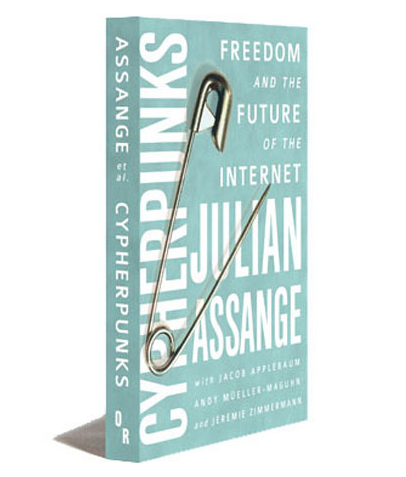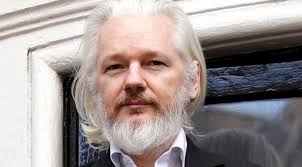
Just found this download link for Julian Assange’s 2012 book Cypherpunk: Freedom and the Future of the Internet. I found it literally less than thirty minutes ago, so I’m posting it here before I’ve had a chance to read it myself. Once I have, I’ll tell you what I think of it. In the meantime, check it out for yourselves! And here is an excerpt from a review by Marienna Pope-Weidemann at http://www.counterfire.org:
A watchman’s shout in the night
Since the infamous PRISM surveillance system was exposed by the NSA analyst Edward Snowden, the existence of what the cypherpunks have long called ‘the transnational surveillance state’ is beyond doubt. Conspiracy has become reality, and paranoia has become the number-one necessity of investigative journalism.
Cypherpunks: Freedom and the Future of the Internet, published last year, describes itself as ‘a watchman’s shout in the night’. An apt description, given everything we have learned lately. What the book is trying to hammer home is the immense importance of the internet as a new political battleground: how it is structured, monitored and used has serious ramifications for political organisation, economics, education, labour, culture and just about every other area of our lives, because increasingly, their world is our world. And if knowledge is power, and it is never been as ubiquitous as it is in cyberspace, there is a great deal at stake.
Who are the cypherpunks?
Begun by a circle of Californian libertarians, the original cypherpunk mailing list was initiated in the late 1980s, as individuals and activists, as well as corporations, started making use of cryptography and, in response, state-wide bans were introduced (p.64). For the cypherpunks, the use of encryption for anonymity and secure communication was the single most important weapon for activists in the internet age.
Their rallying cry was ‘privacy for the weak, transparency for the powerful’; the dictum to which Wikileaks has dedicated itself. As discussed in the book, the subsequent evolution of the internet has taken it in the opposite direction: citizens, politically active or otherwise, law-abiding or otherwise, have lost all right to privacy, while the powerful hide increasingly behind secret laws and extrajudicial practices.
Cypherpunks is a collective contribution of four authors, three of them leading figures in the cypherpunk movement. First we have Julian Assange, who needs less and less introduction as time goes by (there are even two films now devoted to this problematic figure, the independent Australian feature, Underground, and the highly inaccurate box-office disaster We Steal Secrets). Assange has been hacking since the age of seventeen, when he founded the Australian group, the International Subversives, and wrote down the early rules of this subculture: ‘Don’t damage computer systems you break into (including crashing them); don’t change the information in those systems (except for altering logs to cover your tracks); and share information.’ Next we have German journalist Andy Müller-Maguhn of the Chaos Computer Club, co-founder of European Digital Rights and writer for Bugged Planet. Jacob Appelbaum, also a member of the Chaos Computer Club, is the developer who founded Noisebridge, an award-winning educational hackerspace in San Fransisco and international advocate for the Tor Project. Finally, we have the co-founder of the La Quadrature du Net advocacy group, Jérémie Zimmerman, a leading figure in struggles for net neutrality and against the Anti-Counterfeit and Trade Agreement (ACTA) who does not seem to be able to get on a plane without being harassed by government officials over his ties to Wikileaks.

Julian Assange, founder of Wikileaks, has been holed up in the Ecuadorian embassy in London since 2010 to avoid extradition to Sweden and USA. Pic from http://www.extremetech.com




 Posted by Martin X
Posted by Martin X